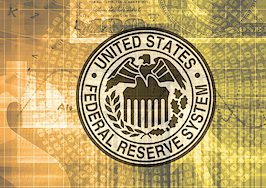- U.S. bonds will be attractive for a long time at low yields for us, but sky-high compared to competitors’.
A sustained rise in long-term interest rates stopped Friday and reversed a bit, but identifying the fingerprints requires a little dusting, lifting and the microscope.

The US 10-year T-note. There have been no economic events to explain today’s drop. Just politics.
The 10-year-T-note on March 13 touched its post-election high at 2.62 percent (the prior top was December 14), with mortgages approaching 4.50 percent.

The US 10-year T-note in the last year. All signs point to a Fed rate hike in June and at least one more in early fall, and then — gulp — the Fed will begin to unwind its balance sheet, inevitably bringing more upward pressure.
(Most days, add 1.80 percent to the 10-year to get close to 30-fixed no-point mortgage rates.)
From that March 2.62 percent, shaky economic data took the 10-year to 2.17 percent on April 18, with mortgages a hair under 4.00 percent. It then rose back to 2.42 percent last week on better data and clear Fed intentions to tighten.
Friday, it went down sharply to 2.33 percent. One could argue that today’s favorable Consumer Price Index did the deed, the core rate up only 0.1 percent.

The U.S. 2-year T-note, ultra-sensitive to the Fed. Markets are fighting tightening ahead — which is good in one way. It means the Fed is ahead of the inflation game, not behind.
But today’s retail sales report was improved, and with last week’s news of unemployment dropping to 4.4 percent, there’s nothing here to push rates down.
That leaves politics. Security threats do move rates, but domestic politics do not, unless there are strong economic implications.

This week’s adventures in D.C. did not directly effect economics. But there is another pattern, called “event risk” — at trading desks known cheerfully as “tape bombs,” with tape referring to old ticker tape, the constant scroll of news on the bottom of everyone’s screens.
I think that’s what this is — the D.C. chaos is now deep enough. The event concern is not that President Trump might be removed, but that he will remain and uncertainty and paralysis will deepen.

The NFIB sub-indices are still useful, showing the economy poking along at about the Fed’s 2% GDP speed limit, little changed in the last couple of years.
In U.S. political tradition, whenever domestic stuff becomes too unpleasant goes overseas. The most powerful force holding down U.S. long-term rates is European illness — hope the patient survives, but never leaves the European Central Bank’s ICU. Following below, a brief survey of European financial politics.

The Atlanta Fed’s GDP tracker is performing as expected, coming down from last week’s high (and probably will continue to slide), and a result near 3% will just offset the 1st quarter’s weak 0.7% result.
What’s happening in Europe?
Transcending fake news, U.S. reporting of the French election has been the worst hack-job in my m
One small risk was blown up into news: the two middle-road candidates could have knocked each other off and forced a runoff between two extremists. Marine Le Pen and her father before her have been wasting our time since 1972 without a snowball’s chance in Hades of being elected to anything. Macron is as establishment as the Eiffel Tower.
French politics defy comparison. France has never gotten over its 1789 revolution, Liberté-Egalité-Fraternité, becoming a hopeless conflict between socialist impulse and capitalism.
France overthrew centuries of Bourbon kings, hostility still hot toward economic plutocrats — very different from the American Revolution’s overthrow of British rule while the Colonies’ economic structure and leadership remained unchanged.
Today’s French government is known as the Fifth Republic. Two of the other four lasted 12 years. France has had two long periods with no republic at all, and the fifth dates only to 1958.
Media reports of “spreading populism” (or Trumpism or nationalism) have been complete hooey. An even sillier fantasy: that Macron will boost One Europe.
The real deal? Germany after three tries by violent means succeeded in buying Europe. Everybody envied the deutschemark (DM), so we’ll let you have it, just rename it “euro.” Every poll finds fatal frustration with the German-controlled EU, but all polls say that everybody wants to keep the euro.
Unfortunately, none but Germany can afford the euro — if the others had the necessary economic discipline, their currencies would have behaved like the DM and the euro would hold no allure.
The bargain with the devil cuts two ways: The euro is still crushing non-German economies, and Germany is frustrated that the others are not honest crooks and refuse to stay bought.
The only way they can survive on the euro is through more money from Germany in the form of a unified EU budget and jointly guaranteed debt. That’s what Macron proposes, and the Germans will have none of it, demanding that the rest of Europe either re-make themselves as good Germans or accept serfdom.
The Brexit factor
Meanwhile, Brexit is underway. Brussels (Germany) has taken a unique negotiating position: cut all U.K.-Euro trade relationships while the U.K. to pays the $64 billion exit fee before any discussion of future economic relationships.
The history of German diplomatic success is short. Its behavior in Brexit preliminaries has been awful, exactly the kind of bullying which caused the Brexit vote in the first place.
Many in the U.K. who were opposed to Brexit will soon flock to polls to give Prime Minister May’s government a landslide.
On July 21 Christopher Nolan’s new Dunkirk will open in theaters. Frau Merkel would do well to see it, and then catch any one of the sequels ending in 1945.
The U.K. is not to be trifled with. The island realm will fight, and the fight will hurt all of Europe.
The European economy is doing better, but it’s a sham. Our Fed tapered QE (quantitative easing) four years ago, but the ECB is still at it, buying bonds like mad and aggregate holdings now beyond the Fed’s.
The weak are weaker than ever.
Thus reason to hope on two grounds: First, U.S. bonds will be attractive for a long time at low yields for us, but sky-high compared to competitors’.
Second, if you are worried or embarrassed by the state of U.S. politics, consider the others.
Lou Barnes is a mortgage broker based in Boulder, Colorado. He can be reached at lbarnes@pmglending.com.









